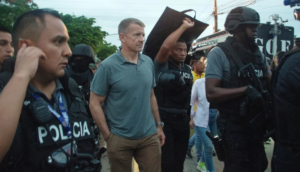Canadian Prime Minister Mark Carney is set to call for an early election, with the vote expected to take place on April 28, according to a government source. The decision comes as Canada faces mounting challenges, including a trade war and sovereignty issues with U.S. President Donald Trump.
The source, who requested anonymity, shared that Carney plans to meet with Governor-General Mary Simon on Sunday to request the dissolution of Parliament. Simon’s role is symbolic, as she represents Canada’s head of state, King Charles III.
Although elections are required by October, the Prime Minister has the authority to call for one at any time before then. This move will officially launch the election campaign.
On Thursday, Carney joined the Edmonton Oilers hockey team for a morning skate, wearing a No. 24 jersey, symbolizing his role as the 24th Canadian Prime Minister.
Mark Carney, a former two-time central banker, was officially sworn in as Canada’s new prime minister on Friday. At 60 years old, Carney succeeded Justin Trudeau, who resigned in January but continued in office until the Liberal Party selected a new leader.
The governing Liberal Party had seemed on track for a historic defeat in the upcoming election, but that changed after U.S. President Donald Trump declared a trade war. Trump’s repeated remarks suggesting that Canada should become the 51st U.S. state have fueled anger among Canadians. This frustration has led to widespread protests, with people booing the U.S. anthem at NHL and NBA games, canceling trips to the U.S., and avoiding American-made products. This surge in Canadian nationalism has helped boost the Liberal Party’s poll numbers.
“This dramatic shift is directly linked to what is widely referred to in Canada as the ‘Trump Effect,'” said Daniel Béland, a political science professor at McGill University in Montreal.
Since being sworn in, Carney has not yet spoken with U.S. President Donald Trump. However, he has expressed willingness to meet with Trump, provided there is mutual respect for Canada’s sovereignty.
Carney, who was the head of the Bank of Canada during the 2008 financial crisis, went on to become the first noncitizen to lead the Bank of England in 2013. There, he played a crucial role in managing the economic effects of Brexit.
Although Carney has no prior political experience, his background includes a tenure as a Goldman Sachs executive. He has stated that his primary focus will be protecting Canadian workers and families against unjust trade actions while striving to grow the Canadian economy.
The Conservatives, led by Pierre Poilievre, were on track for a significant victory in this year’s federal election until Trudeau’s resignation and Trump’s escalation of attacks on Canada’s economy and sovereignty.
Poilievre, a 45-year-old populist and career politician, is known for his fiery rhetoric. He promises to prioritize “Canada first,” advocating for cuts to taxes, defunding Canada’s public broadcaster, and taking a hard stance against the mainstream media.
Initially, the Conservatives planned to center the election around Trudeau’s declining popularity amid rising food and housing costs and increasing immigration. However, the election is now expected to shift focus to the question of who is best equipped to handle U.S. relations.
Trump has imposed a 25% tariff on Canada’s steel and aluminum and is threatening to apply extensive tariffs on all Canadian products starting April 2. He openly stated that his tougher stance on Canada, compared to some of America’s adversaries, is due to his view of Canada potentially becoming the 51st U.S. state.
Despite his trade war with Canada benefiting the Liberal Party, Trump expressed indifference about its impact.
During his first official overseas trip, Carney met with leaders from the United Kingdom and France, aiming to secure support from two of Canada’s longstanding allies.
Canada is also in talks with the European Union to reduce its reliance on the U.S. for security, particularly focusing on increasing the purchase of defense equipment, including fighter jets, from Europe. Part of this plan involves potentially manufacturing Saab Gripen fighter jets in Canada. Carney is reviewing the current order for U.S.-made F-35 fighter jets to explore alternatives in light of the shifting geopolitical landscape.













